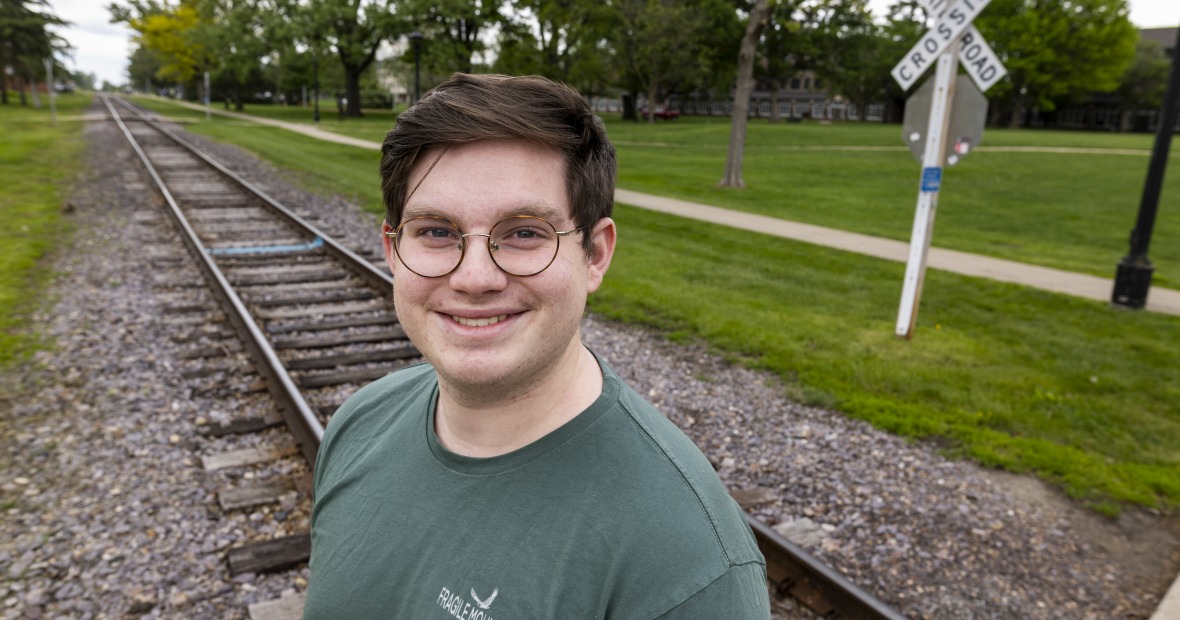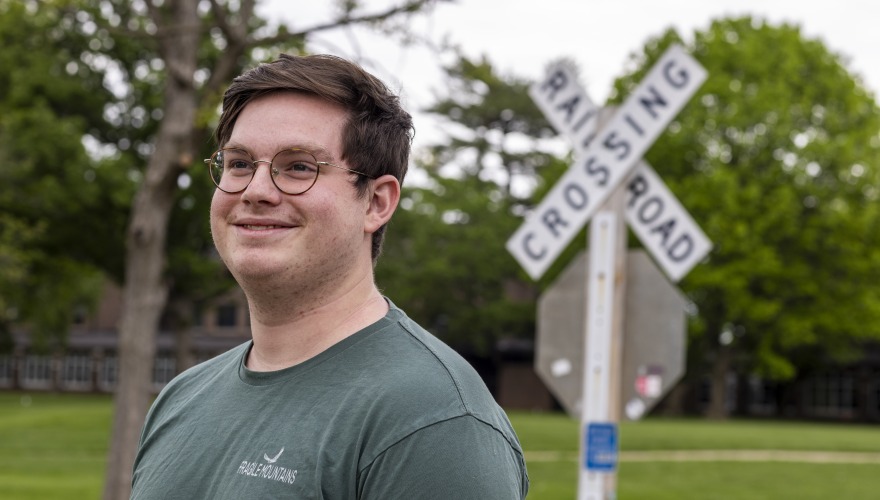Writer Luke Bryson ’25 Receives Honorable Mention in 52nd Nick Adams Short Story Contest
Yesenia Mozo
As a little boy, Luke Bryson ’25 recalled scribbling words as fast as his brain would let him, creating worlds for his short stories. He would go on to write his first short story, “Dangers of the Coffee Love,” where a human boy falls in love with an alien girl.
Bryson, currently an English major with a Film and Media Studies concentration, received an honorable mention for his most recent short story, “The Last 2,500 Miles of Cataract Jack,” in the 52nd annual Nick Adams Short Story Contest. Sponsored by the Associated Colleges of the Midwest (ACM), the short story contest was created to encourage the creativity and talent of fiction writers across the consortium of schools. Bryson’s short story was among the thirty-six short stories submitted to the contest.
Bryson first penned the story in Burling Library for his Creative Short Fiction seminar with former Associate Professor of English Dean Bakopoulos. During a bout of writer’s block, he heard the Grinnell train chug outside the library window, sparking an idea for a narrative. His story would tell the story of a determined narrator and Cataract Jack, who traverse into different parts of the U.S.
“Bakopoulos had mentioned focusing on being more character-driven and eliminating the need for a plot by sticking these characters on a train,” says Bryson. “The physical movement of the trip matches the intention of changing the character and the plot.” In the story, his characters recall traumatic childhood memories and failed romances as they flee a “sickness” threatening their lives.
The story, which Bryson describes as “post-apocalyptic,” was praised by ACM judge Sue Miller, a New York Times bestselling author of 11 novels. “The story’s careful structure,” she remarks, “is such that our narrator only gradually reveals the horror that he and Jack, his companion on the train, are fleeing – and the final poignancy of what the narrator himself has also been moving towards.”
Bryson drew inspiration for his characters from his family, whose distinct voices would shape the dialogue of his characters. “A lot of my dad’s family is from the South,” explains Bryson. “So, I was thinking about my dad’s Texan dialect and my grandpa’s Tennessee dialect. I really wanted the difference in generations [between my characters] to come out between them.” He also decided to write from the perspective of a writer – “someone who is looking at the world.”
Bryson entered the competition after polishing his story in his class’s workshopping sessions. His favorite part of the weekly Monday evening class was how “Dean [Bakopoulos] taught the class. He is part of the reason the story got the success it did in the contest – Dean is incredible in finding what your writing is missing and showing it to you. He also looks at stories cinematically and how they would work on screen. He would ask if a piece of prose could be adapted into a visual media and approach it with a different perspective.”
One of Bryson’s main sources of encouragement for his writing is his father, with whom he shares a love of poet W.S Merwin. They are both inspired by Merwin’s resilience, who notably fills his walls with previous rejection letters of his work. “I’ve been told by a lot of writers that getting out there and sending things get harder the more you delay it,” says Bryson. “Rejection is just a necessary step and so it’s important to take it with as much grace as possible.” His father, who studied American Literature and is currently an English professor, was excited to hear about his son’s honorable mention. He is one of Bryson’s biggest supporters, says Bryson, who fostered his love for writing by helping transcribe his stories when he was too young to write.
Bryson notes that his writing reflects much of his sentiments regarding the world and has been contemplating about his responsibility as a writer. “The themes I find myself coming back to in my stories reflect a lot of what I’ve been feeling over the past few years, which is, what responsibility do you have artistically when it feels like it’s the end of the world? And if it feels like everything’s going to end, do you have a responsibility to create or find beauty for other people?” Currently, Bryson’s notes app is full of ideas and themes he is hoping to tackle in his future writing endeavors.
For aspiring writers, Bryson recommends attending Writers at Grinnell and finding an accountability writing partner. “It’s rare that I’ve left one of those without feeling inspired and wanting to write,” says Bryson. “See if you can find people there who have similar tastes in genres and send writing to them back and forth. There are going to be times when you need to write, but absolutely do not want to. Finding ways to keep yourself disciplined, even when you’re not inspired is really important.”
Read an excerpt of “The Last 2,000 Miles of Cataract Jack” below.
♦♦♦
Ahead, a neon moon on stilts rose over a hill – 4.99 a gallon. The lights of a town stumbled closer as I slipped two shells into Jack’s 12-gauge and leaned it against the console – no one would be home, but precaution is safety. As we began to crawl by the outskirts of the town, it was clear the place was abandoned. Not the kind of abandoned that grows tall grass through picnic benches or sags porches into smiles, but a fresh abandonment. Like the milk in the fridges could still be sweet.
I found myself lost in the emptiness of the place. Then Jack scared the –– out of me. “How old are you now?”
“25.”
“You been around long enough to be in love then.” I shifted in uncomfortable silence. We didn’t talk like this on the tracks. It had a way of spoiling a night with loneliness. In hindsight it makes sense that the end of the world would change the rules.
“I guess.”
“Who was it?”
A water tower lumbered by the engine, spraying a fine mist across the glass. I pointed up at the tower. “That leak’ll never be fixed now.”
“This one of your metaphors?” Jack asked. He loved to give me –– about my bachelors in American Lit.
It was quiet for a minute. He waited for me.
“Her name was Corrin.”
Jack grunted as he lifted into a sitting position. “Tell me about her.”
The supports of a cell tower drifted away in the wind, turned quickly to flaking rust. It would join the rest soon.
“She was something special. An artist. Made things I didn’t get – gritty little collages of stones and wire and sea glass. There was something actually real about them – texture…I don’t know. She lived in Laguna Beach – this little artist’s community not too far from LA.” A pediatrician’s office crawled by, the door held open by a baby’s car seat. I must’ve paused for longer than I thought because Jack prompted me again.
“What was she like?”
A mural, rainbows and flowers and butterflies, spanned the parking lot wall of the pediatrician’s office. Just a week before I saw Corrin for the last time, some beachside sunglasses shop hired her to paint a mural on their storefront. As a fairly unsuccessful artist, this would be her most public work yet, and I asked her over a cup of coffee and a joint if she knew what she’d paint. I’m not sure yet, she’d said. Something that’ll change the world. I knew not to laugh at this. That, in all its absurdity, it wasn’t a joke. Still, I think I scoffed just loud enough for her to hear.
“I knew I’d never find another one of her.”
I wrote in my journal – back when I wrote – about her. I don’t have it anymore but the gist was that she was the kind of person crafted by God in his spare time. A passion project constructed with leftover scraps between the creation of others. An opus he couldn’t bring himself to finish so he affixed, always, more and more clay and stained glass and paint. Somehow she made her way down here, as a monstrous collection of unfinished beauty. Heartbreaking to God, surely. He must’ve known that reality could never have suited her.
“Blonde?”
I shook my head. “Get some rest, Jack.” I lay back, and fell asleep with an absence beside me.


